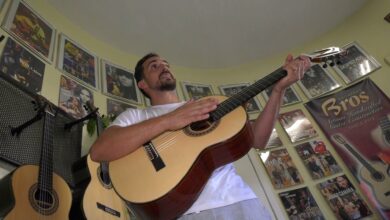Nominations open for new King of Spain Journalism Awards

Madrid, Sep 15 (EFE).- Nominations for the King of Spain International Journalism Awards opened on Wednesday, with six new and updated categories to bring awareness to journalism excellence with 10,000 euros in prize money, similar to the Pulitzer Awards, which consolidates them as the most recognized in Ibero-America.
Founded by Agencia EFE and the Spanish Agency for International Development Cooperation (AECID), the awards recognize the work of professional journalists working in the Spanish and Portuguese languages from the countries that make up the Ibero-American community and nations with which Spain has close ties.
“Agencia EFE has changed the name and structure of the most prestigious awards that we have conferred for 39 years,” Agencia EFE President Gabriela Cañas said, highlighting AECID’s key role in making them possible.
The award categories have been reduced from ten to six, as “a firm commitment to the value of journalism, irrespective of the format they are published,” Cañas said.
The objective of EFE and AECID is to advance the awards “which aspire to consolidate over time as a new brand, with a long-term commitment,” the head of EFE said.
HUMANITARIAN, SOCIAL, CULTURAL AND ENVIRONMENTAL VALUES IN THE NEW CATEGORIES
The six categories now include the King of Spain International Award for Narrative Journalism, which will go to the best story, in text, digital, video or audio format, that contributes to citizens’ right to information and fosters their general interest in knowledge.
The International Cooperation and Humanitarian Action Journalism Award will be given to the work, in any media format, that contributes to promoting values related to education and sport that help create fairer, more cohesive societies and improve people’s lives.
The Environmental Journalism Award will be for the best work that contributes to the communication of sustainable development behavior and models, as well as to a better socio-environmental culture.
In addition, the Cultural Journalism Award will recognize work that contributes to disseminating values related to culture and art with the aim of creating more informed societies and encouraging creative and critical thinking among people.
The Photography Award is for the best image or graphic report that stands out for its particular approach and explores all the medium’s possibilities.
The final category is the International Journalism Award to Ibero-American Media, aimed at highlighting the work of Ibero-American media companies published in any of the Spanish languages or in Portuguese.
THE ESSENTIAL LINK BETWEEN FREE PRESS AND COOPERATION
“It is a source of pride for AECID to present these awards, which bring together the best examples of Ibero-American journalism, committed journalism in our sister languages of Spanish and Portuguese,” Anton Leis, the Spanish Agency for International Development Cooperation Director, said.
Leis emphasised that the new awards, in which “we reinforce the essential link between free and quality press and cooperation,” materialized in the International Cooperation and Humanitarian Action Award, “which will promote the work of the media in pursuit of sustainable development in our partner countries. These awards make the values and principles of Spanish cooperation visible.”
Nominations opened on Wednesday and can be submitted until December 15.
The jury is to meet virtually to determine the winners and is to be composed of a representative from Agencia EFE, another from AECID and five renowned professionals from across Ibero-America.
The awards cover the 22 Ibero-American countries (Argentina, Bolivia, Brazil, Chile, Colombia, Costa Rica, Cuba, Ecuador, El Salvador, Spain, Guatemala, Honduras, Mexico, Nicaragua, Panama, Paraguay, Peru, Portugal, Puerto Rico, Dominican Republic, Uruguay and Venezuela), Angola, Cape Verde, United States, Philippines, Guinea-Bissau, Equatorial Guinea, Israel, Morocco, Mozambique, Andorra, Sao Tome and Principe and East Timor.
The King and Queen of Spain have presented the awards, first by emeritus King Juan Carlos I and Queen Sofia, and later by King Felipe VI and Queen Letizia.
Winners include writers such as Mario Vargas Llosa, winner of the Nobel Prize for Literature, and the Spanish author Arturo Pérez Reverte. EFE





